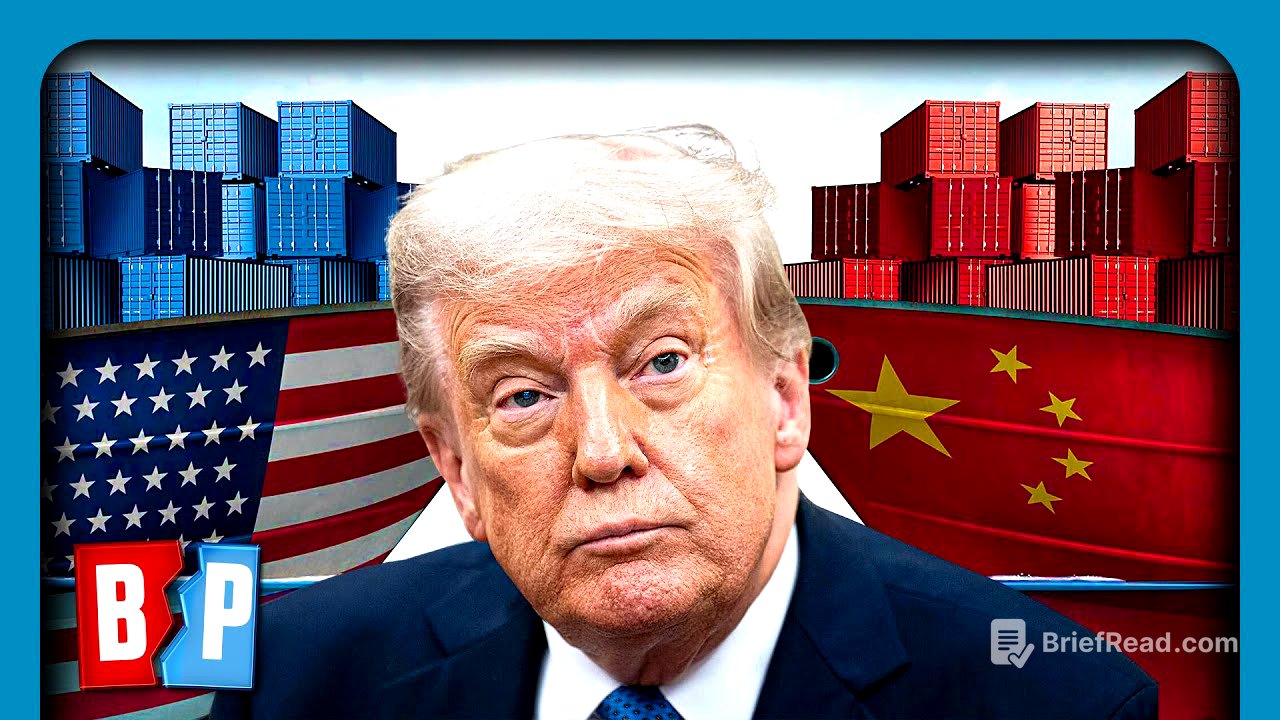TLDR;
The video discusses the potential economic fallout from the Trump trade war with China, highlighting its impact on shipping, employment, and consumer prices. It also addresses the broader implications for the American brand and the US dollar's strength, referencing concerns raised by Ken Griffin. The conversation touches on the vulnerability of specific sectors like toy manufacturing and the delay of an Intel plant due to tariff uncertainties. The speakers contrast Trump's tariff-focused approach with the Biden administration's industrial policy, which aimed to rebuild American manufacturing through strategic investments and incentives.
- The Trump trade war is causing a significant drop in shipping activity at West Coast ports, impacting jobs and the supply chain.
- Price hikes are already being observed in various sectors, including low-cost retailers like Shein, and are expected to continue.
- Ken Griffin warns that the trade war is eroding the American brand, particularly the strength of US treasuries and the US dollar.
- The US toy industry is facing potential collapse due to delayed and canceled orders, with many companies at risk of going out of business.
- The speakers argue that Trump's tariff-only approach to manufacturing is insufficient and that the Biden administration's industrial policy was showing promise before being disrupted.
Impact of Trade War on Shipping and Employment [0:00]
The Trump trade war is now visibly impacting shipping, with West Coast ports experiencing a 50% year-over-year drop. This decrease in vessels significantly affects the movement of containers, impacting truckers, railroads, and warehousing, ultimately leading to potential job losses. The Port of Oakland, which relies on a balanced import-export ratio, has already issued warnings about job losses due to the trade war. Even if a trade deal is reached soon, the effects will linger due to the time required to resume trade and manufacturing.
Supply Chain Disruptions and Price Hikes [2:24]
The supply chain is currently facing significant disruptions, with numerous ships stuck in China because companies are unable to pay the increased tariffs. Major retailers like Walmart and Home Depot have warned about potential stock shortages. Shein, a low-cost retailer, has already implemented substantial price hikes, with some items increasing by as much as 377%. There's a risk of Chinese companies dumping goods in other countries, potentially harming local manufacturers.
Ken Griffin's Warning on the American Brand [4:57]
Ken Griffin highlights that the United States is more than just a nation; it's a brand representing culture, financial strength, and military power. He warns that the current trade war is eroding this brand, particularly the strength of US treasuries and the US dollar. Griffin emphasizes that the US Treasury market's creditworthiness is at risk, which could take a long time to recover. The decline in the American brand could also negatively impact tourism, which accounts for a significant portion of the GDP in states like Florida, Nevada and Gulf Coast.
Vulnerability of Specific Sectors and the Intel Plant Delay [10:43]
Certain sectors of the US economy are heavily reliant on China, such as the toy industry and stroller manufacturing, where a significant percentage of products are made in China. The US toy industry is already experiencing negative impacts, with companies delaying or canceling orders, and many small and mid-sized companies risk going out of business within weeks or months. Additionally, an Intel plant has been delayed until 2031 due to uncertainties related to tariffs, which will result in job losses.
Contrasting Trump's Tariffs with Biden's Industrial Policy [12:12]
China is taking steps to support its companies and workers affected by the trade war, while the US lacks a unified system to do the same. The speakers argue that Trump's tariff-only approach to rebuilding American manufacturing is insufficient. They contrast this with the Biden administration's industrial policy, which included strategic investments and incentives through acts like the Infrastructure Act, the CHIPS Act, and the Inflation Reduction Act. These policies were showing positive trends in rebuilding American manufacturing in key sectors before being disrupted.









